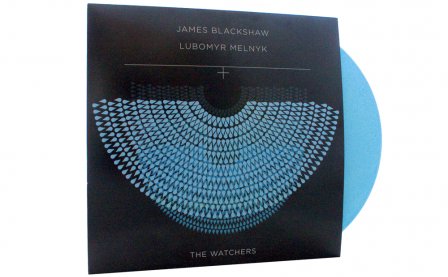Silent movies bloom vignettes in dust; they are inexact. The Passion of Joan of Arc, maybe the pinnacle of dramatic silent filmmaking, put me to sleep. There was crying — lost time — fire — lost time — footsteps trampling — lost time. Not to its detriment or insult, mind you; it was an incredibly memorable viewing experience, but something detached, certainly inexact, abstract. There is meaning in things not intended to have meaning, poetry in misunderstanding, etc. — many more ways of saying the same thing, to the point that context is not the thing, doesn’t matter, never has; silent movies now come off as fever dreams, blinking and flittering and archaic.
Taking James Blackshaw’s score for Le Faux Magistrat out of context seems essential, considering it is being released on its own. Falling asleep in a movie, you get glimpses of things happening — abnormal things — and you take those pieces and make a new whole. Instrumental music, too, is by its nature inexact; in its wordlessness, it creates something entirely unspecific, letting the listener make meaning out of anything. There is something profound, too, in the way that we are here acknowledging that this is a score for a movie, but not noting, other times, when music is made — as it almost always is — as a response to something else, be it other music (made through copying) or playing along to a muted television.
Moreover, on that, Blackshaw has pronounced himself to be an incredible melody writer and musician in a tradition that existed long before him; he writes guitar and folk music as well as Robbie Basho or Leo Kottke, but he does not copy them — a distinction that is increasingly lost and holds true all across this score. The press release says he was inspired by all sorts of things, one of them being Pino Donaggio, a composer who scored lots of movies but did a notable six-film run with Brian DePalma, whose “Telescope” on the Body Double score is one of my favorites. But nothing on this sounds like Donaggio, especially. The influence shrugs; it was just a reference point, arbitrary. In fact, the saxophone that pops up from time to time calls to mind Howard Shore and Ornette Coleman’s score for Naked Lunch more than anything else, hold for maybe some early Weather Report tracks. It has a fusion feel to it, incidentally so.
Le Faux Magistrat is a mix of circling themes that either come back around in full at some time or return in the background as echoes and glimpses. Some of it is raucous and loud, parts of it abstract for five-minute stretches, but a lot of it is just gorgeous. There is a part early on that sounds like a whole church choir made inside of reverb and delay pedals. Another section sounds a lot like Yann Tiersen, who invited Blackshaw to make the score to begin with. A lot of it is performed on a piano, beautifully. It all holds up unquestionably; to think of this as anything less than its own album seems like a slight. In a record store landscape overrun with releases of incidental soundtrack music from 30-year-old horror movies — where John Carpenter is experiencing a renaissance not as a filmmaker but as a composer — our sense of meaning in making something is skewed. We care about cultural context — a world of analog synthesizers and our imaginations of the past — over creation context or intention. What was background has come to the fore.
This score only furthers my intuition that all art should exist behind a black veil, away from one-sheets and press releases and reference points; of course, this is an alien ideal that, for convenience’s sake, can’t be. But that this music is created as a response to something else is a necessity; it’s just that in this case we know what it’s responding to, interacting with, whereas oftentimes we don’t. It stands alone, probably stronger than it would have if played only as a companion to some other piece, the movie maybe less entertaining than the score it produced — which is another idiosyncrasy of art, the byproducts being better than that which spawned them, etc. — many more ways of saying the same thing, to the point that context is not the thing, doesn’t matter, never has.
More about: James Blackshaw




